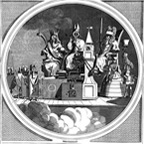Federalism or a decentralized system of government is still spreading out in Africa and elsewhere as A constitutional device for multinational divided societies. First and foremost, the grassroots of the adoption of a federal “solution” shall be traced in the aftermath of World War II, which led to the dismemberment of colonial empires. Among British colonies federal arrangements were considered a viable option for multinational societies facing independence. Nevertheless, in Africa, federalism was roughly rejected in most of its manifestations. From 1960 onwards, Africa’s leitmotiv has been, military coups, civil war, genocides and violence among ethnic groups. Until the end of the Cold War, African federal States, under authoritarian military regimes, became strongly centralized. Afterwards and to date, the revival of the federal option in Sub-Saharan Africa has been strictly connected to the enforcement of participatory democracy, the accountability of local administrators and their interplay. The constitutional framework of relevant States in Sub-Saharan Africa (Nigeria, Somalia, Democratic Republic of Congo, South Africa, Uganda, Ethiopia, Sudan, South Sudan), embodies federal arrangements, seeking to address ethnic diversity and, at same time, fostering a sense of belonging to a given State.
This book focuses on one of the most multifaceted countries in the Continent, underlining an overlooked feature: revenue sharing and oil politics. The book by Dele Babalola, The Political Economy of Federalism in Nigeria, Palgrave Macmillan, 2019, aims to demonstrate the significance of the political economy, fiscal federalism and revenue sharing, in the Nigerian Federation. It does not intend to put aside other approaches, like the institutional or constitutional (Wheare), sociological (Livingston), purely political (Riker) and developmental approach (Friedrich). Babalola does not dismiss these abovementioned approaches; in his words “it is worthwhile to go beyond the traditional approaches […] This study considers an alternative analytical framework, which builds on the traditional approaches but pays more attention to the political and economic forces that impact on the federation” (p. 20). Federal fiscal dynamics in a flawed and fragile federation, whose chronical instability must be traced back in its artificial creation, well described by Watts as “perhaps the most artificial of all the countries created in the course of the European occupation of Africa”, are under the spotlight. […]






